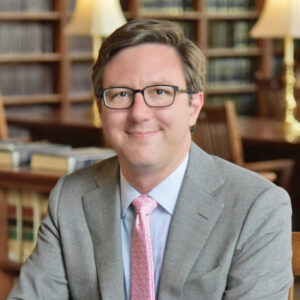
Travis Crum
Associate Professor of Law
Travis Crum is an Associate Professor of Law at Washington University in St. Louis. Professor Crum’s scholarship explores the relationship between voting rights, race, and federalism. His current projects examine the Fifteenth Amendment as an independent constitutional provision and the role of racially polarized voting in redistricting.
Professor Crum’s scholarship has appeared or is forthcoming in the Columbia Law Review, the Cornell Law Review, the Duke Law Journal, the Northwestern University Law Review, the Notre Dame Law Review, and the Yale Law Journal. His scholarship has been cited by federal courts, including in the U.S. Supreme Court’s recent decision in Allen v. Milligan. His work on the Voting Rights Act’s bail-in provision was described by the Wall Street Journal as the “blueprint” for the “Obama administration’s new legal strategy to preserve decades of minority-voting rights” in the aftermath of the Supreme Court’s decision in Shelby County v. Holder striking down the VRA’s coverage formula. He has been quoted in the New York Times, the Washington Post, and MSNBC. He is a frequent contributor to the Election Law Blog. Professor Crum’s proposal for an effects-test bail-in provision was incorporated in the John R. Lewis Voting Rights Advancement Act of 2021, which passed the U.S. House of Representatives.
Professor Crum served as a law clerk to Justice Anthony Kennedy and Justice (Ret.) John Paul Stevens on the U.S. Supreme Court, Judge David Tatel on the U.S. Court of Appeals for the DC Circuit, and Judge Myron Thompson on the U.S. District Court for the Middle District of Alabama. While in practice, he was a Bristow Fellow in the Office of the Solicitor General of the United States and an associate at Mayer Brown LLP. Immediately prior to joining the faculty, he was a Bigelow Fellow at the University of Chicago Law School. Professor Crum received his JD from Yale Law School, his master’s degree from the London School of Economics, and his undergraduate degree from Johns Hopkins University. He was a first-generation college student.
- Education
- Yale Law School, J.D., 2011
- London School of Economics, MSc, Comparative Politics (Politics and Markets), 2007
- Johns Hopkins University, B.A., Political Science and Economics, 2006
- Courses
- Voting Rights
- Constitutional Law
- Law of the Fourteenth Amendment
- Areas of Expertise
- Voting Rights
- Election Law
- Constitutional Law
- Reconstruction
- U.S. Supreme Court
- Publications
Academic Work
- The Riddle of Race-Based Redistricting, 124 Columbia Law Review (forthcoming 2024)
- The Unabridged Fifteenth Amendment, 133 Yale Law Journal 1039 (2024)
- The Lawfulness of the Fifteenth Amendment, 97 Notre Dame Law Review 1543 (2022)
- Deregulated Redistricting, 107 Cornell Law Review 359 (2022)
- Reconstructing Racially Polarized Voting, 70 Duke Law Journal 261 (2020)
- The Superfluous Fifteenth Amendment?, 114 Northwestern University Law Review 1549 (2020)
- The Voting Rights Act’s Secret Weapon: Pocket Trigger Litigation and Dynamic Preclearance, 119 Yale Law Journal 1992 (2010)
Selected Commentary
- Justice Alito Embraces a Retrogression Standard, Election Law Blog (Feb. 22, 2024)
- Stopping Alabama’s Defiance of the Voting Rights Act, Election Law Blog (Oct. 10, 2023)
- Bailing in the Sunshine State, Election Law Blog (Mar. 31, 2022)
- Revising Sections 2 and 5 in the John Lewis Voting Rights Advancement Act of 2021, Election Law Blog (Aug. 17, 2021)
- Avoiding Avoidance in Brnovich, Election Law Blog (July 1, 2021)
- The Curious Disappearance of Shelby County, Election Law Blog (Mar. 27, 2020)
- The Fifteenth Amendment at 150, Election Law Blog (Jan. 26, 2020)
- Rucho and Section 2 of the Voting Rights Act, Election Law Blog (June 27, 2019)
- The House Should Pass an Effects-Test Bail-in Provision, Election Law Blog (Nov. 15, 2018)
- Download CV